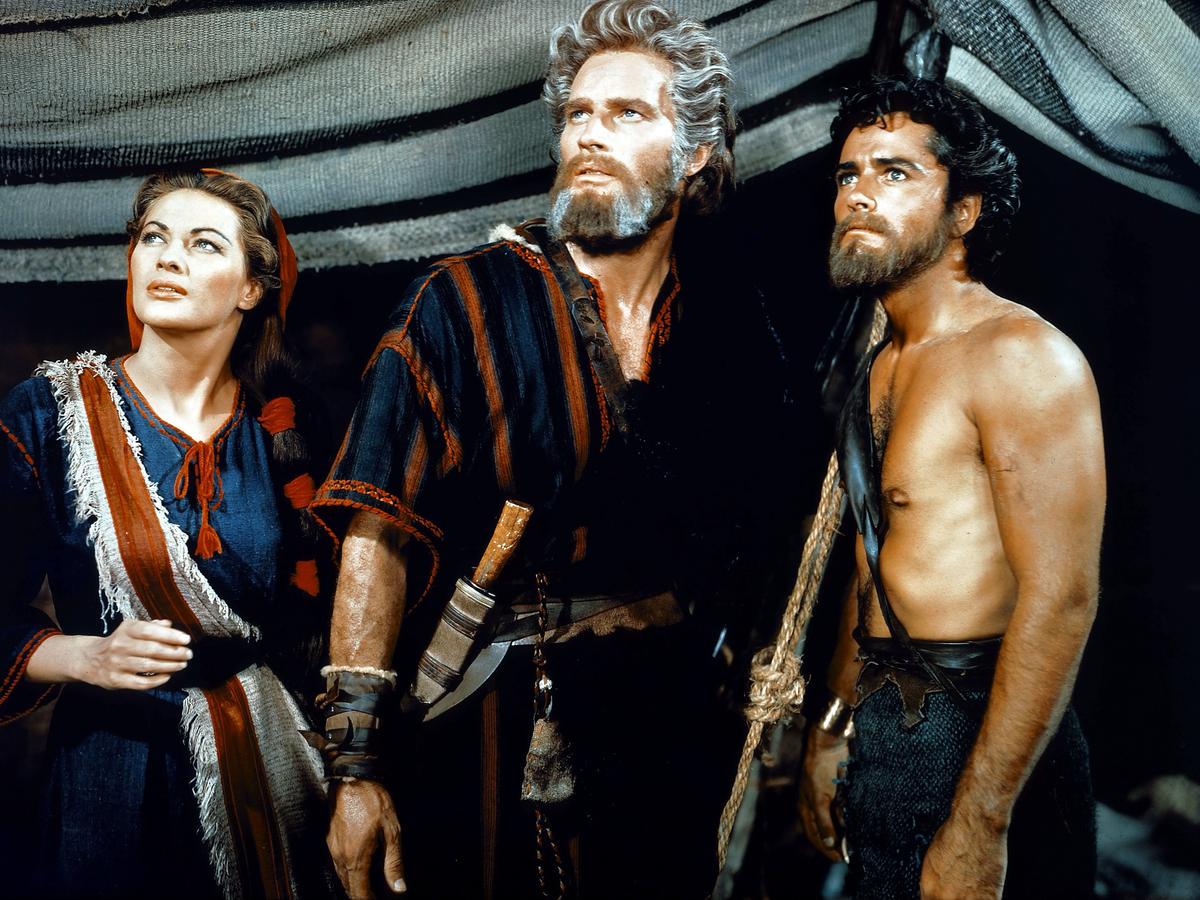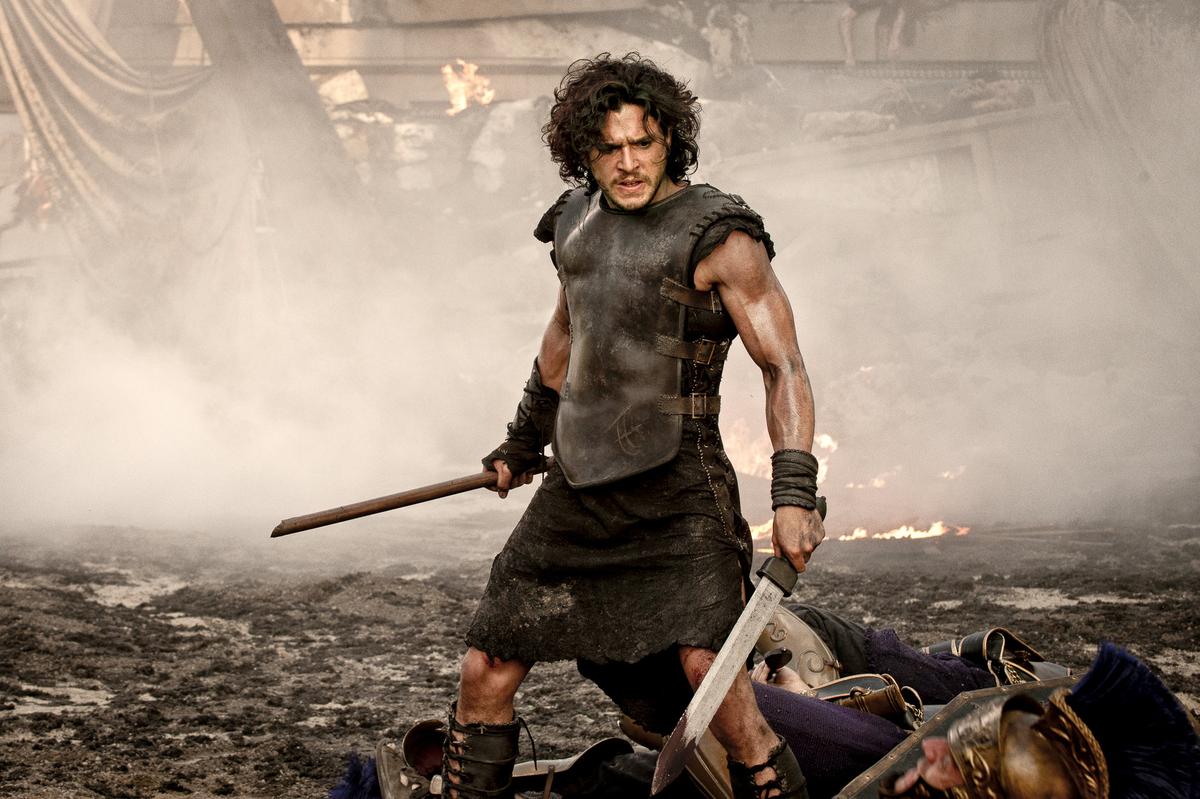Table of Contents
In the beginning there was, no, not the word, though that too was there, but we are talking of the beginning of Hollywood’s mining of The Bible for spectacle on screen — therefore, in the beginning there was the Word. The ‘50s and ‘60s were the golden age of epic spectacle in Hollywood with 1959’s Ben-Hur being the jewel in the multi-hued crown.
The naval battle and the chariot race still rocks as does Charlton Heston as the Jewish Prince who is done wrong by his best friend turned nasty foe, the Roman Messala (Stephen Boyd). Ben-Hur’s roaring rampage of revenge is only staunched when he witnesses Christ forgiving those who crucified him from the cross.
The golden age
While some of the stories from those days were taken from The Bible, including Cecil B. DeMille’s Samson and Delilah (1949) with Victor Mature and Hedy Lamarr and The Ten Commandments (1956) starring Heston as Moses, another prince in search of his legacy, and the scalding hot Yul Brynner as Rameses and Anne Baxter as Nefretiri, there were others that were Bible adjacent.
The Robe (1953), has Richard Burton playing the Tribune who commands the unit that crucifies Christ and how that experience changes him. Quo Vadis (1951), set during the final years of Emperor Nero’s reign was the greatest fun for Peter Ustinov’s turn as the Emperor — I can see him staring through the emerald in my mind’s eye. Quo Vadis, meaning “whither goes thou”, are the first words St Peter said to risen Christ on the Appian Way.

Yvonne De Carlo, Charlton Heston and John Derek in a scene from the film ‘The Ten Commandments’
| Photo Credit:
Archive Photos
Stanley Kubrick, as always marched to his own drum, and with Spartacus (1960), he did so in a spectacularly quiet way. Set according to the voice over, “In the last century before the birth of the new faith called Christianity,” the film about a slave, who became a gladiator and led a rebellion against the pagan Romans (yes, yes, Ridley Scott’s Gladiator also follows similar beats) stars Kirk Douglas of the delicious cleft chin as Spartacus. Ustinov has fun as Batiatus, who recruits Spartacus into his gladiatorial school but it is Laurence Olivier as Crassus and his famous bathtub exit line to his slave, “My tastes include both snails and oysters,” that shocked and thrilled film goers.

A digital turn
The millennium saw a resurgence of swords and togas starting with Scott’s multiple-Oscar winning Gladiator in 2000. The Christian overtones were done away with as we all bowed and prayed to the digital deity we made and CGI was king. From increasing the height of a model of the Colosseum, to shooting animals against a green screen and compositing them to the frames later on, all kinds of VFX magic was bought to bear. Russell Crowe played Maximus, a Roman general forced into slavery, while Joaquin Phoenix is much more fun as wicked, incestuous Emperor Commodus, than a certain clown with a frown.

The Biblical epic saw a return 10 years ago, with Darren Aronofsky’s Noah (2014) where Crowe played the Old Testament patriarch as well as reboots of The Ten Commandments and Ben-Hur. Scott’s Exodus: Gods and Kings (2014) featured Christian Bale as Moses crossing swords with Joel Edgerton’s Ramses II. Scott’s Alien star, Sigourney Weaver, was also in the film as Queen Tuya. Timur Bekmambetov’s Ben-Hur (2016) starring Jack Huston and Toby Kebbell as Ben-Hur and Messala, was not much fun.

A lack of imagination
Paul W. S. Anderson’s Pompeii, also in 2014 was epically dreadful. Set against the eruption of Mount Vesuvius in 79 AD, the film starred Game of Thrones’ Kit Harington as a gladiator yada yada. Carrie-Anne Moss and Kiefer Sutherland, among others, looked like they desperately wanted to be smothered by the ash from Vesuvius. The film also proved that no matter how great the technical advances, nothing could take the place of imagination, which is comforting in a way, for the day AI can create a gripping film is the day Skynet truly takes over.

A still from Paul W. S. Anderson’s ‘Pompeii’
Ancient Greece and Rome featured better on the small screen with HBO’s Rome charting the power struggles during Julius Caesar’s time over two well regarded seasons and Starz’ Spartacus. The latter created by Sam Raimi, told the story of the slave general who took on the might of the Roman empire over three excellent seasons.
Rome during Julius Caesar provides much fodder for drama with its battles, political maneuvering and crisis of faith about the divine rights of kings. Caesar took Rome to the pinnacle with his conquests and public works but also paved the way for its ruin, with the formula of bread and circuses

Those About To Die, which dropped on Amazon Prime Video last month, while loosely inspired by Daniel P. Mannix’s eponymous book, which also served as the inspiration for Gladiator was toe-curlingly bad, with CGI not backed by any imagination. Hopefully, Gladiator II, also directed by Scott starring Paul Mescal, Pedro Pascal, Connie Nielsen, and Denzel Washington, will prove to be a perfect blend of state-of-the-art VFX and imagination. If not, we can always go back to Ben-Hur, the galley slave number 41, the exhilarating naval battle, and the goose-bump inducing chariot race. Incidentally, the chariot race finds echoes in the galaxy far, far away in Anakin’s pod race in The Phantom Menace, no?

